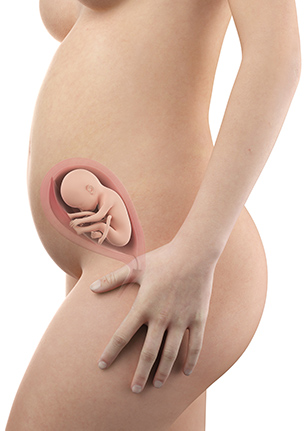Congratulations on making it to Week 21 of your pregnancy! This is a truly special time as you’re now past the halfway mark of your pregnancy journey. Your growing baby is developing rapidly, and you may start to notice some exciting changes in both your body and your little one’s movements. Each day brings something new, and it’s perfectly normal to feel a mix of excitement and curiosity. Remember, you’re doing an amazing job—even on days when you feel tired or uncertain.
At this stage, your baby is about the size of a carrot and is becoming more active inside the womb. You might feel gentle kicks, rolls, or little flutters that are unique to you and your baby. Many moms describe these first real movements, called “quickening,” as one of the most magical parts of pregnancy. Don’t worry if you haven’t felt definite movements yet—every pregnancy is different, and sensations can vary from person to person.

As your belly grows, you might notice some new changes in your body, too. Common experiences around Week 21 can include a bit of backache, stretch marks, or swelling in your feet and ankles. These are normal and simply show that your body is working hard to nurture your growing baby. Now is a good time to focus on gentle movement, comfy clothing, and propping up your feet when you get a chance to rest.
Your appetite may be increasing as well, so remember to choose a variety of colorful fruits, vegetables, lean proteins, and whole grains. Staying hydrated and listening to your body’s signals is especially important right now. You might also start thinking about things like maternity leave, nursery planning, and your baby shower—let your excitement grow as you prepare for the chapters ahead!
- Baby is about the length of a carrot and starting to look more like a tiny newborn.
- You may feel more energy and strong fetal movements.
- Your body is adapting in new ways to help your baby grow.
This week is about enjoying the moment and taking good care of yourself. Be patient with your changing body and, whenever you need it, don’t hesitate to reach out to your doctor or support network. You’re doing wonderfully, and each week brings you closer to meeting your baby.
Your Baby’s Development This Week
Welcome to week 21 of your pregnancy! By now, your baby is truly starting to feel more like a little person growing inside you. Picture something about the size of a large carrot or banana — that’s how big your baby is right now, measuring around 10.5 inches from head to heel and weighing close to 12 ounces. So much is happening in there as your little one continues to get stronger and more active every day.
At this point, your baby is busy putting on more fat, which is important for staying warm after birth. Until now, your baby’s body looked a bit lean, but as fat builds up, those adorable baby rolls will start to develop. This tiny bit of extra insulation will help your baby regulate their temperature when they take their first breaths in the outside world.
Many parents look forward to feeling their baby’s movements — and at 21 weeks, these wiggles and kicks are getting stronger and more regular. You might notice a sudden flutter, jab, or even what feels like a gentle somersault as your baby practices all kinds of motion. Every baby is different, but don’t worry if you’re not noticing a pattern yet; over the next few weeks, these movements should become more predictable and reassuring. Some moms find these “baby dances” most noticeable in the evening, just as they’re winding down for the day.
Your baby’s features are also becoming more defined. Tiny eyebrows can now be seen, and their eyelids are forming, even though they’ll stay closed for a few more weeks. A soft, downy hair called lanugo covers your baby’s skin right now—this acts as a protective blanket and is totally normal. There’s also a special waxy substance, called vernix, coating their skin to protect it from the watery environment of the womb.
Inside, big milestones are happening. If you’re expecting a girl, her ovaries already hold millions of eggs. If you’re having a boy, his testes are forming but remain tucked inside the abdomen for now. The digestive system is hard at work too: your baby is swallowing amniotic fluid, which helps develop their tummy and taste buds. You might even catch a glimpse of baby hiccups on an ultrasound, which can feel like tiny, rhythmic jumps from the inside!
- Senses in Action: Your baby’s taste buds are becoming more sensitive, meaning the flavors you eat could be getting a “sneak peek” in the womb. Amniotic fluid can take on hints of the foods in your diet, so variety helps baby explore new tastes.
- Skin Protection: Vernix and lanugo work together to keep your baby’s skin soft and healthy until birth. Most of this protective layer will be gone before delivery, but some babies are born with traces.
- Rest and Play: While your baby doesn’t keep the same schedule as you do, their sleep and awake cycles are slowly developing. You might notice more movement when you’re still, like when lying down at night.
Every week brings exciting growth, and by week 21 your baby is not only getting bigger but also more active and prepared for life outside the womb. Take a moment to enjoy these milestones and remember, every flutter or hiccup is a special sign that your baby is growing healthy and strong. If you ever have questions or concerns about your baby’s development, keep the conversation open with your provider — they’re there to support you at every step.
Changes in the Mother’s Body
At 21 weeks pregnant, your body is working hard to support your growing baby, and you’re probably noticing some brand-new changes each week. By now, you might feel more connected to your pregnancy, not just emotionally, but because of all the shifts happening inside and out.
One of the most obvious changes is your growing belly. Your womb has stretched well above your hip bones, which may make your pregnancy more visible to those around you. Clothes might start to feel a bit snug around your middle, and many women find that this is a good time to look for comfortable maternity wear. You might even take a little pride in showing off your beautiful bump!
You may notice changes in your skin as well. As your body makes room for baby, skin can stretch quickly, and some women develop pink, red, or purple marks known as stretch marks. These commonly appear on the belly, hips, thighs, or breasts. While no one can completely prevent them, keeping your skin moisturized and staying hydrated may help reduce itchiness and tightness. It’s important to remember that stretch marks are normal and are a sign of your body’s amazing work.
With the expanding belly, your center of gravity is shifting. You might find yourself a bit more off-balance than before. This is completely normal but does mean it’s a good idea to take extra care when you’re walking or using stairs. Wearing supportive, flat footwear can help you feel steadier on your feet.
Your joints and ligaments become a bit more relaxed and stretchy now, thanks to pregnancy hormones like relaxin. This allows your pelvis to prepare for birth but can lead to aches and pains, especially in your lower back or hips. Don’t hesitate to rest when you need to, and consider gentle stretching, swimming, or prenatal yoga to keep your body comfortable and flexible.
- Increased appetite: Many women find themselves craving more food at this stage. It’s perfectly normal to feel hungrier, but try choosing a variety of healthy snacks—like yogurt with fruit, a handful of nuts, or whole-grain crackers—so you and your baby get plenty of nutrition.
- Heartburn and indigestion: As your baby grows and hormones relax the muscles in your digestive tract, you might notice more heartburn or an unsettled stomach. Eating smaller meals, avoiding spicy or greasy foods, and sitting upright after eating can help.
- Leg cramps: These can strike, especially at night, leading to uncomfortable sleep. Stretching your legs before bed and staying hydrated can sometimes make a big difference.
- Energy swings: Some moms-to-be feel a much-welcome boost of energy around this time, while others may still feel tired. Listen to your body, and don’t be too hard on yourself if you need extra rest.
- Mild swelling: It’s common for your feet and ankles to swell a bit, particularly after standing or sitting for long periods. If you notice sudden or severe swelling, though, let your provider know right away.
You may also be more aware of your baby’s movements now—those gentle flutters and soft kicks are a special way to bond. If you haven’t already begun, take time each day to relax and enjoy these little reminders of your growing baby.
The physical and emotional changes happening now are all part of your incredible pregnancy journey. Take care, be gentle with yourself, and know you are doing an amazing job.
What Medical Checkups Happen at Week 21?
At 21 weeks, you’re just over halfway through your pregnancy! This is an important time for both you and your baby, so regular care from your doctor or midwife matters more than ever.
Here’s what you can expect during this stage of prenatal visits and screenings:
- The Big Anatomy Scan (Detailed Ultrasound): If you haven’t already had it at week 20, this ultrasound often happens this week. The technician will gently move a wand across your belly to create pictures of your baby. This scan checks your baby’s growth, examines tiny organs like the heart and brain, makes sure there aren’t any major concerns, and looks at the position of the placenta. If you want to know the baby’s sex, this is when you’ll usually find out—though only if the baby cooperates!
- Checking Your Health and Baby’s Progress: During your prenatal visit, your provider may:
- Weigh you and check your blood pressure—these are important for spotting early signs of pregnancy complications.
- Measure your belly to see how your baby and uterus are growing. Usually, this is done by measuring from your pubic bone up to your belly button—this “fundal height” helps track if growth is on track.
- Listen to your baby’s heartbeat with a small handheld device. The steady sound can be both reassuring and exciting to hear!
- Check your ankles, legs, and hands for swelling, and ask about any symptoms you’ve noticed since your last appointment.
- Planning for More Tests: Some additional screenings might be discussed or planned soon, such as:
- Glucose screening (for gestational diabetes): This is usually scheduled between weeks 24 and 28, but your provider might let you know about it now so you’re prepared.
- Extra blood or urine tests: If you have risk factors for certain conditions, your doctor may recommend more checks to keep you and your baby safe.
- Symptom and Wellness Check: Your provider will want to hear about anything new you’re feeling. Be open about discomforts like back aches, odd cramps, headaches, or if your baby’s movements change. Never be shy about sharing—even small symptoms can give your provider helpful clues.
- Talk Through Your Questions and Plans: This is a safe space to discuss how you’re feeling emotionally as well as physically. Many moms-to-be find it helpful to mention their hopes, anxieties, or plans for labor and delivery. Your provider is there for all aspects of your well-being—not just the medical stuff.
Remember, your prenatal visits are for you and your baby. They give you peace of mind, help catch any issues early, and keep your pregnancy on the healthiest path possible. And if you ever notice heavy bleeding, persistent pain, or a sudden drop in your baby’s movement, don’t wait—call your healthcare provider right away.
Nutritional Tips and Physical Exercise
At 21 weeks pregnant, your baby is growing quickly—and so are your needs. Giving your body the right nutrients and moving in healthy ways can make these changes feel easier and help your baby develop strong and healthy.
Here are some fresh tips and ideas just for this stage:
- Keep meals colorful. Try to fill your plate with a variety of fruits and vegetables. Each color offers different vitamins and minerals. For example, sweet potatoes and carrots are rich in vitamin A, while leafy greens give you iron and folate.
- Boost your magnesium. This mineral can help reduce leg cramps, which are common around this time. Add foods like nuts, seeds, whole grains, and beans to your meals or snacks.
- Snack smart for steady energy. If hunger strikes between meals, reach for options like plain yogurt with berries, hummus with carrot sticks, or whole-grain toast with nut butter. These snacks give you a gentle energy boost without causing blood sugar spikes.
- Don’t forget fiber. Constipation can sneak up on you in the second trimester. Whole grains, beans, pears, and prunes are gentle ways to add more fiber (and comfort) to your diet. Don’t forget to drink extra water when you add fiber, as it helps everything move along.
- Cook in creative ways. If some foods or smells suddenly turn you off, try grilling, roasting, or lightly steaming veggies instead of boiling them—they may taste and smell better. Switching cooking methods can keep meals enjoyable.
- Limit added sugars and salty foods. With a growing appetite, it’s easy to reach for sweets or processed snacks. Opt instead for naturally sweet options like fresh or dried fruit, and choose unsalted nuts or seeds for crunch.
- Stay flexible with exercise. Safe activities like walking, prenatal yoga, gentle swimming, or using an exercise ball can support your changing body and relieve typical aches. Moving your body often helps circulation, boosts mood, and prepares you for labor. Always listen to your body—if anything feels uncomfortable, slow down or take a break.
- Focus on posture and balance. Your center of gravity is shifting. Simple balance exercises, like standing on one foot while holding onto a sturdy chair or practicing gentle squats, can help you feel steadier. Good posture also eases backaches.
- Stretch to soothe muscles. Try gentle stretching routines, especially for your lower back and legs. Prenatal yoga classes—either in person or online—teach safe stretches and breathing techniques perfect for pregnancy.
- Pair up and make it fun. If you have a workout buddy, ask your partner or a friend to join you for walks, making it easier to stick with routine and enjoy quality time. Even a ten-minute stroll after dinner helps digestion and relaxation.
Every pregnant body is unique. It’s perfectly normal if your energy, hunger, or interest in movement goes up and down from day to day. The most important thing is to be kind to yourself, keep choices balanced, and check with your healthcare provider before starting any new exercise or making big changes to your eating habits.
Weekly Checklist
Congratulations on reaching week 21! Your baby is growing quickly and your body is working hard. Here’s a list of simple things you can do this week to support your well-being and look after your baby’s development. Remember, each pregnancy can be a little different, so listen to your body and reach out to your care provider with any questions.
- Pay attention to baby’s movement patterns. Start noticing when your baby is most active. Some days may feel quieter than others, but you’ll likely feel more flips, kicks, and stretches now. Share any big changes in activity with your doctor or midwife.
- Check in on your posture and comfort. As your belly grows, daily routines like bending or standing may feel different. Try supporting your back with a cushion when sitting, and take breaks to move and stretch often—this can help with backaches and balance.
- Protect your skin as it stretches. You might notice itchiness or new stretch marks. Use a gentle moisturizer daily on your belly, breasts, and hips. This helps soothe tight skin and can be a relaxing self-care ritual.
- Review the results of your anatomy ultrasound. If you’ve recently had your detailed scan, make a note of any results or questions you want to discuss at your next appointment. This is a good time to ask your provider about what’s next with your prenatal care.
- Keep up with gentle physical activity. Short walks or prenatal yoga can boost your energy, help with sleep, and improve circulation. Wear supportive shoes and keep water nearby, especially if the weather is warm.
- Stay mindful of your meals and snacks. If you feel hungrier, plan small, healthy snacks—like oatmeal, yogurt, or fruit with nut butter—to have between meals. Eating steadily throughout the day can help with heartburn and steady your blood sugar.
- Try different sleep positions. As your belly grows, side sleeping (especially on your left) can improve comfort and help blood flow to your baby. You might like placing a pillow between your knees or under your bump for extra support.
- Monitor any new body changes. Mild swelling, leg cramps, or tingling may pop up this week. Let your provider know about swelling that suddenly worsens or pain that doesn’t go away—most changes are normal, but it’s okay to ask!
- Update or start a baby journal. Write down your thoughts, hopes, or even funny dreams about your baby. This can be a lovely keepsake for the future and helps you process how you’re feeling each week.
- Reflect on your emotional well-being. Take a few minutes to check in with yourself. Mood changes can be common now. If you’re feeling sad, anxious, or overwhelmed, talk to someone supportive or your healthcare provider—your feelings matter.
- Start exploring childbirth classes. Look into online or local classes about labor, delivery, and newborn care. Signing up early ensures you find a class that fits your schedule and helps you feel more prepared.
You’re doing an amazing job, and each little step you take helps both you and your growing baby. Be gentle with yourself as you move through these weekly changes, and don’t hesitate to seek support when you need it.
When to Call Your Provider
Your body and your baby are changing quickly now, and while most symptoms you feel are a normal part of pregnancy, there are times when reaching out to your healthcare provider is important. Trust your instincts—if something feels off, don’t hesitate to get help.
Here’s a simple guide to help you know when to pick up the phone:
- Heavy Bleeding or Passing Clots: Any bleeding that soaks through a pad in an hour, or blood clots, should be reported right away.
- Sudden or Severe Abdominal Pain: Strong cramping or sharp pains that come on suddenly or don’t go away may need immediate attention.
- Leaking of Fluid: If you notice a gush or steady trickle of fluid from your vagina that is not urine, it could mean your water has broken early.
- Noticeable Decrease in Baby’s Movements: By now, you’re getting to know your baby’s little kicks and flips. If those become much less frequent, call your provider to check in.
- Severe Headache, Vision Changes, or Dizziness: Headache that won’t go away, lights flashing in your eyes, or feeling faint—especially if these are new—should be taken seriously.
- Persistent Vomiting: Occasional morning sickness is normal, but if you’re unable to keep any food or fluids down for more than a day, reach out to your doctor.
- Unusual Swelling: Some swelling is common, but if your face, hands, or legs suddenly get much more swollen, that’s worth calling about.
- Burning with Urination or Signs of Infection: Pain, burning, fever, or cloudy urine could signal a urinary tract infection, which is best treated promptly.
- High Fever: If you develop a fever that won’t go away with acetaminophen (Tylenol) or if you feel chills and body aches, let your provider know.
- Shortness of Breath or Chest Pain: New difficulty breathing, heart pounding, or pain in your chest needs immediate evaluation.
- Feelings of Sadness or Anxiety That Won’t Go Away: Your emotional health matters, too. If you’re feeling down, overwhelmed, or anxious most days and it’s hard to cope, share this with your care team—they’re here for you.
Remember, you never have to wait for your next appointment to ask questions or share concerns. No worry is too small when it comes to your wellbeing and your baby’s. Your provider wants to help you feel confident and supported every step of the way.
Preparations for Baby
Week 21 is an exciting time—your baby is growing stronger, and you’re past the halfway point! Now is a wonderful moment to start preparing both emotionally and around the house. Taking small steps now can help you feel calmer and more confident when your little one arrives.
- Take a moment to bond: Try talking or singing to your bump. Your baby can’t understand yet, but your voice is soothing, and these moments make the pregnancy feel a little more real.
- Start a journal: Write down your feelings, hopes, or even funny moments. Later, you’ll cherish these memories—and they can be a lovely keepsake for your child.
- Browse for baby essentials: Make a list of basics you’ll need like a crib, car seat, and diapers. You don’t need to buy everything at once—just gathering ideas and window shopping can be fun and less stressful when done little by little.
- Set up a comfy resting area for yourself: As your bump grows, it’s important to have a cozy spot to relax. Consider adding extra pillows to your bed or a soft chair where you can rest, read, or practice deep breathing.
- Talk with your support system: Share your thoughts or any worries with your partner, family, or friends. Letting others know how you’re feeling makes it easier to ask for help later if you need it.
- Look into childbirth classes: Now’s a good time to sign up for courses or workshops—many are available online or in-person. These classes can answer questions about labor and what to expect after baby is born, helping you feel empowered and informed.
- Consider practical home changes: Think about where the baby will sleep and play, and start clearing out a drawer or space in your room for baby items. Simple organizing now saves you from scrambling later.
- Make time for self-care: Whether it’s a warm bath, a short walk outside, or simply putting your feet up, taking care of your own well-being helps you stay strong for the weeks ahead.
Remember, there’s no need to have everything finished all at once. Give yourself permission to enjoy this special chapter, celebrate small milestones, and reach out when you need advice or a listening ear. You’re doing a wonderful job getting ready to welcome your baby!
Citations and References
- The American College of Obstetricians and Gynecologists (ACOG) – Offers guidance on second trimester changes, prenatal visits, fetal development, and nutrition. Visit Source
- Mayo Clinic – Detailed overview of week-by-week pregnancy, covering fetal growth, maternal body changes, symptoms, and nutritional requirements. Visit Source
- Cleveland Clinic – Provides clear information on fetal milestones, maternal symptoms, and recommended screenings during pregnancy. Visit Source
- Centers for Disease Control and Prevention (CDC) – Evidence-based advice for prenatal care, including nutrition, weight gain, and common discomforts. Visit Source
- National Institutes of Health (NIH): MedlinePlus – Covers key aspects of fetal development, maternal needs, and wellness in the second trimester. Visit Source
- World Health Organization (WHO) – Offers international standards for prenatal care, maternal health, and nutrition. Visit Source
- March of Dimes – Comprehensive guide to week 21 fetal development, screenings, healthy eating, and warning signs during pregnancy. Visit Source
- NHS (National Health Service, UK) – Reliable week 21 pregnancy advice, including fetal progress, changes in the mother’s body, and checkup information. Visit Source









